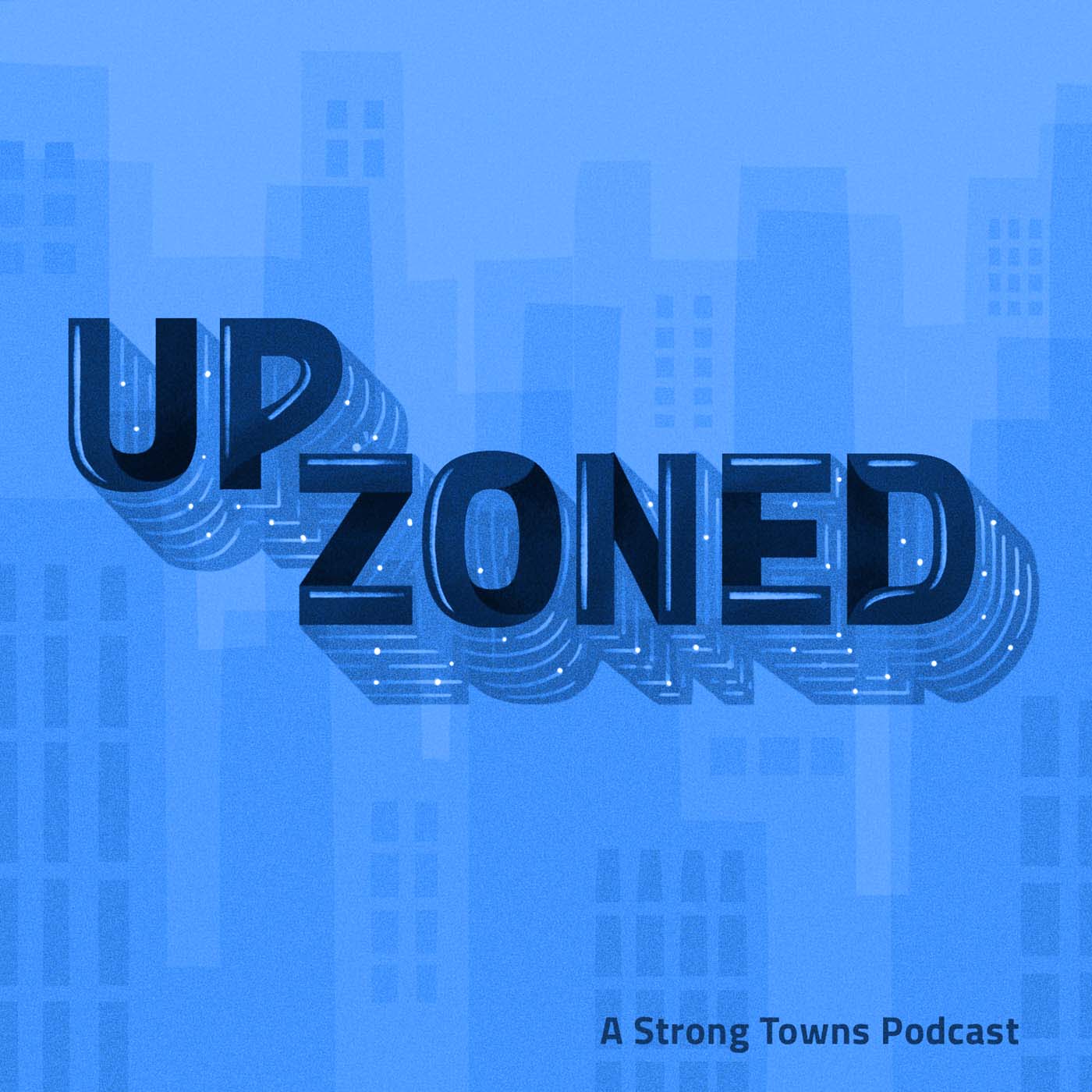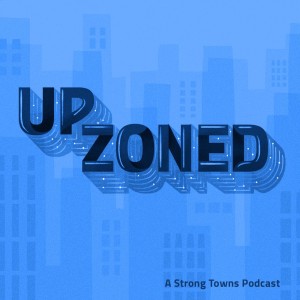
Sometimes, a hot new story will cross our desks that we need to talk about right away. That's where Upzoned comes in. Join Multistudio's Abby Newsham, Strong Towns President Chuck Marohn, and other guests to talk in depth about one big story from the week in the Strong Towns conversation, right when you want it: now.
Sometimes, a hot new story will cross our desks that we need to talk about right away. That's where Upzoned comes in. Join Multistudio's Abby Newsham, Strong Towns President Chuck Marohn, and other guests to talk in depth about one big story from the week in the Strong Towns conversation, right when you want it: now.
Episodes

Wednesday May 01, 2024
Cincinnati Pledges $200K in Funding for Popular Bikeshare Service
Wednesday May 01, 2024
Wednesday May 01, 2024
The city of Cincinnati has pledged $200k to keep the popular bikeshare program Red Bike alive for another year. Joining us to talk about bikeshare programs and Red Bike’s financial difficulties is Bryce Mortera, a member of Civic Cincinnati. Are these programs really beneficial for residents? And if so, is there a more sustainable way to fund them than relying on sponsors?

Wednesday Apr 24, 2024
Department of Justice Opens Criminal Investigation Into “Housing Cartel”
Wednesday Apr 24, 2024
Wednesday Apr 24, 2024
The U.S. Department of Justice is opening a criminal investigation into a major software company called RealPage, which is described in the lawsuit as the “big tech” company of rental housing. It provides software that is used by landlords (and, typically, landlords who are large holders of rental property) to estimate supply and demand for their listings in order to help them maximize rents. The question is whether or not RealPage is facilitating algorithmic price fixing for some of the largest residential property owners and management firms—amounting to what DC Attorney General Brian Schwalb has described as a “housing cartel.” And since Strong Towns has just released Escaping the Housing Trap: The Strong Towns Response to the Housing Crisis, we figured there was no better time to discuss this story than now.
ADDITIONAL SHOW NOTES
-
Order your copy of Escaping the Housing Trap: The Strong Towns Response to the Housing Crisis today!
-
“DOJ escalates price-fixing probe on housing market,” by Josh Sisco, Politico (March 2024).

Wednesday Apr 17, 2024
Inside the Notorious Gridlock of Colorado's I-70
Wednesday Apr 17, 2024
Wednesday Apr 17, 2024
Since the 1970s, the number of cars on I-70 between Denver and its surrounding resorts have jumped more than 500%. Coloradans and frequent visitors know that, in order to reach the mountains during the gridlock of ski season, you must leave as early as 3 or 4 a.m. in the morning. Writer Gloria Liu decided to investigate this chaos by jumping directly into the traffic and interviewing the people stuck in it, and the article she penned about her adventure is up for discussion on this week’s episode of Upzoned. Can I-70 be fixed? And what do famous recreational arterials like I-70 reveal about our relationship with nature in the U.S.?
ADDITIONAL SHOW NOTES
-
“Colorado’s I-70 Has America’s Most Notorious Ski Traffic. Is There a Solution?” by Gloria Liu, Outside (March 2024).

Wednesday Apr 03, 2024
“Redesigning” Cincinnati With the Connected Communities Plan
Wednesday Apr 03, 2024
Wednesday Apr 03, 2024
Cincinnati is currently undergoing a significant planning reformation effort, which involves unveiling what’s being called the Connected Communities plan. It includes a number of proposed land-use-related policy changes that are intended to help Cincinnati grow, with the goal of advancing zoning code changes, as well as supporting diversification and affordability of housing and bolstering business districts. Here on Upzoned this week to talk with host Abby Newsham about the proposal is John Yung, an urban planner, Program Manager at the Haile Foundation, and co-leader of the Cincy host committee for the upcoming Congress for the New Urbanism, which (along with the Strong Towns National Gathering) will be taking place in Cincinnati in May.
ADDITIONAL SHOW NOTES
-
“Mayor Pureval wants to redesign Cincinnati. Here's what that could look like,” by Becca Costello, WVXU (January 2024).

Wednesday Mar 20, 2024
Our Financial System Favors Large-Scale Development…but at What Cost?
Wednesday Mar 20, 2024
Wednesday Mar 20, 2024
On this week’s episode of Upzoned, host Abby Newsham and co-host Chuck Marohn are joined by Coby Lefkowitz, who penned the article that’s up for discussion: “Why small developers are getting squeezed out of the housing market.” It focuses on how finance shapes our cities, why debt is used to develop cities in the first place, how lenders deal with risk, and why risk mitigation is critical to understanding why the world looks the way it does. And, most notably, it dives into America's housing financial system and why it privileges large-scale institutional development at the expense of more incremental and community-based building.
ADDITIONAL SHOW NOTES
-
“Why small developers are getting squeezed out of the housing market,” by Coby Lefkowitz, Noahpinion (March 2024).

Wednesday Mar 13, 2024
Wednesday Mar 13, 2024
This week on Upzoned, host Abby Newsham is joined by Michael Schneider, founder of Streets for All and the campaign manager for Healthy Streets Los Angeles. They discuss an article from The Los Angeles Times titled, “L.A. bus and bike lane measure will cost $3.1 billion, a new report says. Backers cry foul.” This piece was written in advance of the ballot proposal Measure HLA, which was recently approved by voters, and mandates the installation of hundreds of miles of transportation improvements in L.A. over the next decade, with a focus on bike lanes and sidewalk improvements.
(Editor’s note: This episode was recorded before the results of the ballot were released.)
ADDITIONAL SHOW NOTES
-
“L.A. bus and bike lane measure will cost $3.1 billion, a new report says. Backers cry foul,” by David Zahniser, The Los Angeles Times (February 2024).
-
“The People of Los Angeles Just Said ‘Yes’ to Safer Streets,” by Asia Mieleszko, Strong Towns (March 2024).

Wednesday Mar 06, 2024
$350 Million Mixed-Use Development Presents a "Huge Opportunity" for South Bend, IN
Wednesday Mar 06, 2024
Wednesday Mar 06, 2024
This week on Upzoned, host Abby Kinney is joined by Mike Keen, a retired professor and incremental developer in South Bend, Indiana, to discuss a recent article in WSBT, “Major mixed-use development could be largest in downtown South Bend history.” It highlights a $350 million project that has been proposed in downtown South Bend: a mixed-use district that would include hotels, apartments, and commercial uses, to be completed by 2028. The development, led by nearby Memorial Hospital, will take up about two city blocks and is expected to be a catalytic project for the city. So, we ask: is this project going to be a positive for South Bend and its small-scale developers like Keen?
ADDITIONAL SHOW NOTES
-
“Major mixed-use development could be largest in downtown South Bend history,” by Sean English, WSBT (February 2024).
-
“This ‘Accidental Developer’ Wants To Show You How To Revitalize Your Neighborhood,” by Seairra Jones, Strong Towns (April 2023).
-
Escaping the Housing Trap: A Strong Towns Response to the Housing Crisis by Charles Marohn. Available for preorder now!

Wednesday Feb 21, 2024
Could this New Approach to Public Housing Actually Work?
Wednesday Feb 21, 2024
Wednesday Feb 21, 2024
A suburb of Washington, DC is exploring a new approach to creating more affordable housing through public-private partnerships. And it’s seeing success! In this episode of Upzoned, Chuck and Abby discuss the history of public housing and government housing subsidies in the US, the good, the bad and the ugly. Then they consider whether this new model could be helpful or harmful to cities.
ADDITIONAL SHOW NOTES
-
“What if public housing were for everyone?” by Rachel M. Cohen, Vox (February 2024).
-
Escaping the Housing Trap: A Strong Towns Response to the Housing Crisis by Charles Marohn. Available for preorder now!

Wednesday Feb 14, 2024
Parking Minimums Might Be on the Way Out in Dallas
Wednesday Feb 14, 2024
Wednesday Feb 14, 2024
Local officials in Dallas are considering eliminating minimum parking requirements in the city. The zoning ordinance advisory committee just voted to advance the measure to the city planning commission, and if approved there, it would then go on to the city council.
Critics believe that this is a one-size-fits-all approach to parking reform and that it’s not an ideal solution to Dallas’s parking dilemma, whereas proponents say the change will cut down on unused parking spaces and accelerate the city’s economic development.
So, is this measure a good or a bad move for Dallas?
ADDITIONAL SHOW NOTES
-
“Dallas Zoning Committee Advances Parking Reform,” by Andrew Terrell, The Dallas Express (February 2024).

Wednesday Feb 07, 2024
Coming Back Down to Earth After a “Next-Level” Downtown Revitalization
Wednesday Feb 07, 2024
Wednesday Feb 07, 2024
This week’s Upzoned episode covers a story that sounded promising at the start: “The Town That Took Downtown Renewal to the Next Level”? Sounds great! Right? Alas, residents of Morristown, Tennessee, have discovered that the Skymark (i.e., an elevated sidewalk) they built in the 1960s was not the salvation for their downtown they’d hoped it would be. Join host Abby Newsham and co-host Chuck Marohn as they take a deep dive on how this huge investment, unfortunately, didn’t pan out as a long-term strategy for economic prosperity.
ADDITIONAL SHOW NOTES
-
“The Town That Took Downtown Renewal to the Next Level,” by David Zipper, CityLab (January 2024).
